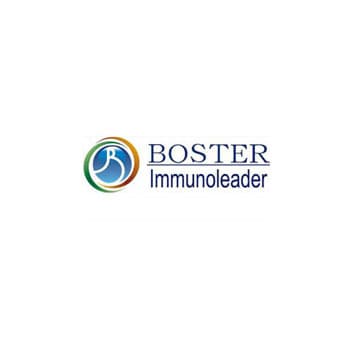
Supplier:
BOSTER IMMUNOLEADERCat no: PA1676
Polyclonal Anti-NR4A1
Prices direct from BOSTER IMMUNOLEADER
Quick response times
Exclusive Biosave savings/discounts
SPECIFICATIONS
Price
200.00 USD
Catalog Number
PA1676
Size
100ug/vial
Applications
WB
Reactivities
Hum, Mouse, Rat
Form
Lyophilized
Format
Each vial contains 5mg BSA, 0.9mg NaCl, 0.2mg Na2HPO4, 0.05mg Thimerosal, 0.05mg NaN3.
Gene Id
NR4A1
References
1.Chang, C., Kokontis, J., Liao, S. S., Chang, Y. Isolation and characterization of human TR3 receptor: a member of steroid receptor superfamily. J. Steroid Biochem. 34: 391-395, 1989.\n2.Dequiedt, F., Kasler, H., Fischle, W., Kiermer, V., Weinstein, M., Herndier, B. G., Verdin, E. HDAC7, a thymus-specific class II histone deacetylase, regulates Nur77 transcription and TCR-mediated apoptosis. Immunity 18: 687-698, 2003.\n3.Forman, B. M., Umesono, K., Chen, J., Evans, R. M. Unique response pathways are established by allosteric interactions among nuclear hormone receptors. Cell 81: 541-550, 1995.\n
Swiss Prot
P22736
Storage Temp
At -20 degree C for one year. After reconstitution, at 4 degree C for one month. It can also be aliquotted and stored frozen at -20 degree C for a longer time.Avoid repeated freezing and thawing.
Additional Info
A synthetic peptide corresponding to a sequence at the N-terminal of human NR4A1, identical to the related rat and mouse sequences.
Scientific Background
NR4A1(NUCLEAR RECEPTOR SUBFAMILY 4, GROUP A, MEMBER 1), also called NAK1, GFRP1, TR3, NUR77 or NGFIB, is a protein that in humans is encoded by the NR4A1 gene, which is also a member of the Nur nuclear receptor family of intracellular transcription factors. The NR4A1 gene is mapped on 12q13.13. NR4A1 is involved in cell cycle mediation, inflammation and apoptosis. It plays a key role in mediating inflammatory responses in macrophages. In addition, subcellular localization of the NR4A1 protein appears to play a key role in the survival and death of cells. Nr4a1 was overexpressed in Wnt1 -transformed mouse mammary cells. Nr4a1 was also induced by lithium, a Wnt1 mimic, and the Nr4a1 promoter was activated by lithium and beta-catenin, a Wnt1 downstream effector. In contrast, human NR4A1 was not upregulated by beta-catenin, indicating that this gene is regulated differently in human and mouse cells. Adenoviral expression of Nr4a1 induced genes involved in gluconeogenesis, stimulated glucose production both in vitro and in vivo, and raised blood glucose levels.
More from BOSTER IMMUNOLEADER
Applications
IHC, WB
Reactivities
Hum
Applications
IHC, WB
Reactivities
Mouse, Rat
Applications
ELISA, WB
Reactivities
Mouse
Applications
WB
Reactivities
Hum, Mouse, Rat
Applications
IHC, WB
Reactivities
Hum
Latest promotions
Spend less time on DNA cleanup so you can do more science. The MSB Spin PCRapace is the fastest way to purify your DNA from PCR, restriction digestion, and...
New brilliant antibodies, and new lower prices!For flow cytometry reagents in general, \"bright is better.\" The violet-excitable BD Horizon™ BV421 and...
As an incentive to qualify our BSA, we are offering a 20% discount when you purchase your first 100g, 500g or 1000g of any grade of Bovine Serum Albumin....
It is not every day that you are given something for nothing. We are giving away additional spectrophotometer software.Cecil Instruments have enhanced the...
We're so sure that you'll prefer Cayman Assay kits over your present brand that we're willing to give you a free assay kit to prove it!
Did your supplier increase the price of Fetal Bovine Serum? Did they substitute the US Origin with USDA? Well say no more! Innovative Research is still...
For the past decade scientists have extensively used ATS secondary toxin conjugates to make their own targeted toxins for in vitro use.The ability to combine...
10% Discount on 2 Rabbit Polyclonal Antibody Service. With over 20 years experience, SDIX has developed into the premier US custom antibody producer,...
Bulk Cytokines with Custom Vialing.20 - 50% off cytokines, growth factors, chemokines and more...For a limited time Cell Sciences is offering substantial...
Are you planning to have a customised antibody made for your research?Since 2000, Everest has been producing a catalog containing thousands of affinity...
Jenway’s 73 series spectrophotometer range provides four models with a narrow spectral bandwidth of 5nm and an absorbance range of –0.3 to 2.5A,...
Top suppliers
United States Biological
230753 products
Carl Zeiss Microscopy
27 products
Promega Corporation
11 products
Panasonic Healthcare Company
5 products
Life Technologies
1 products
Nikon Instruments Europe
11 products
Olympus Europa Holding GmbH
3 products
Leica Microsystems, Inc.
10 products
GE Healthcare Life Sciences
2 products
Tecan Trading AG
19 products
Beckman Coulter, Inc.
1 products
AB SCIEX
3 products
BD (Becton, Dickinson and Company)
1 products
RANDOX TOXICOLOGY
5 products
Randox Food Diagnostics
6 products


















